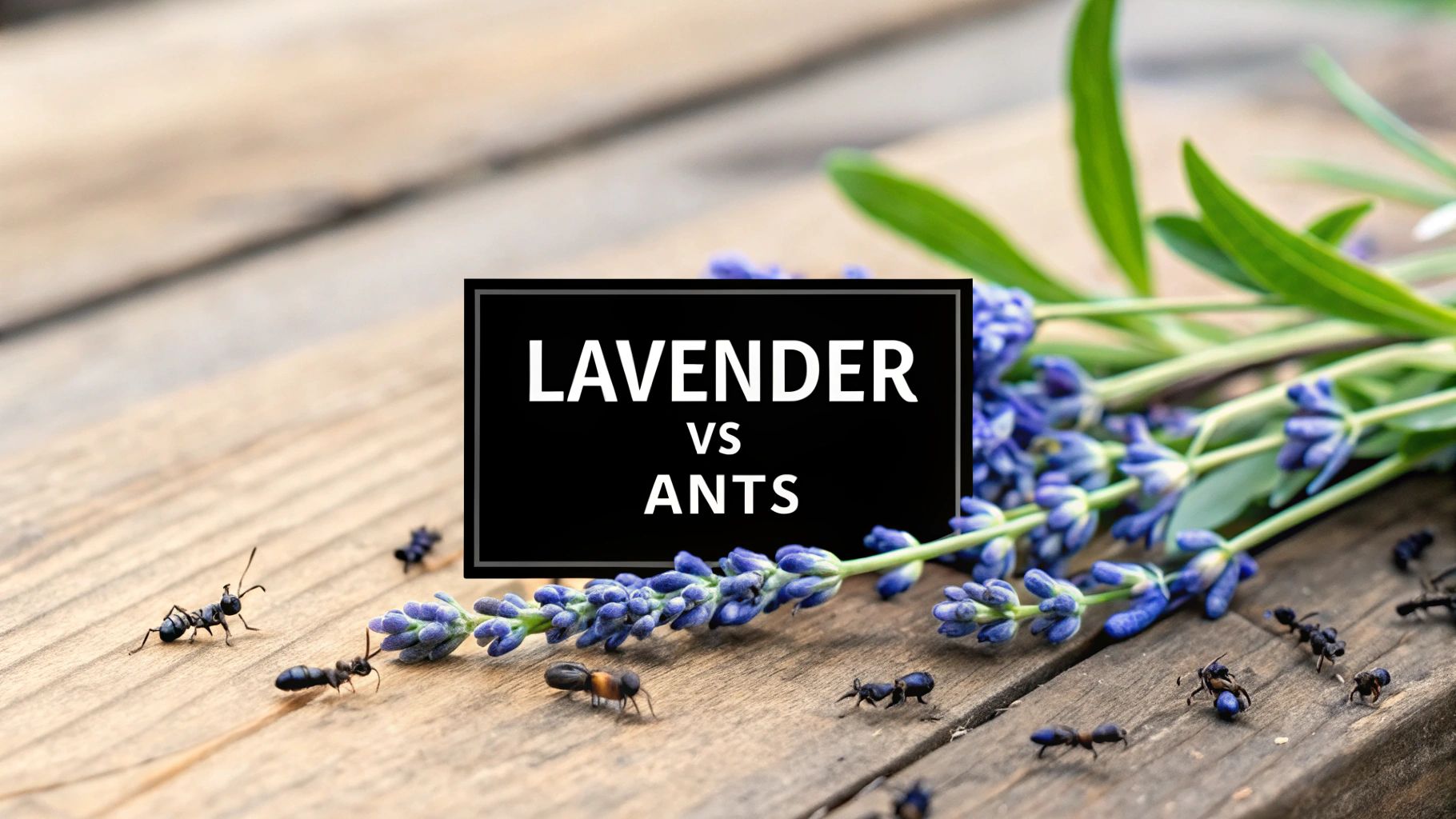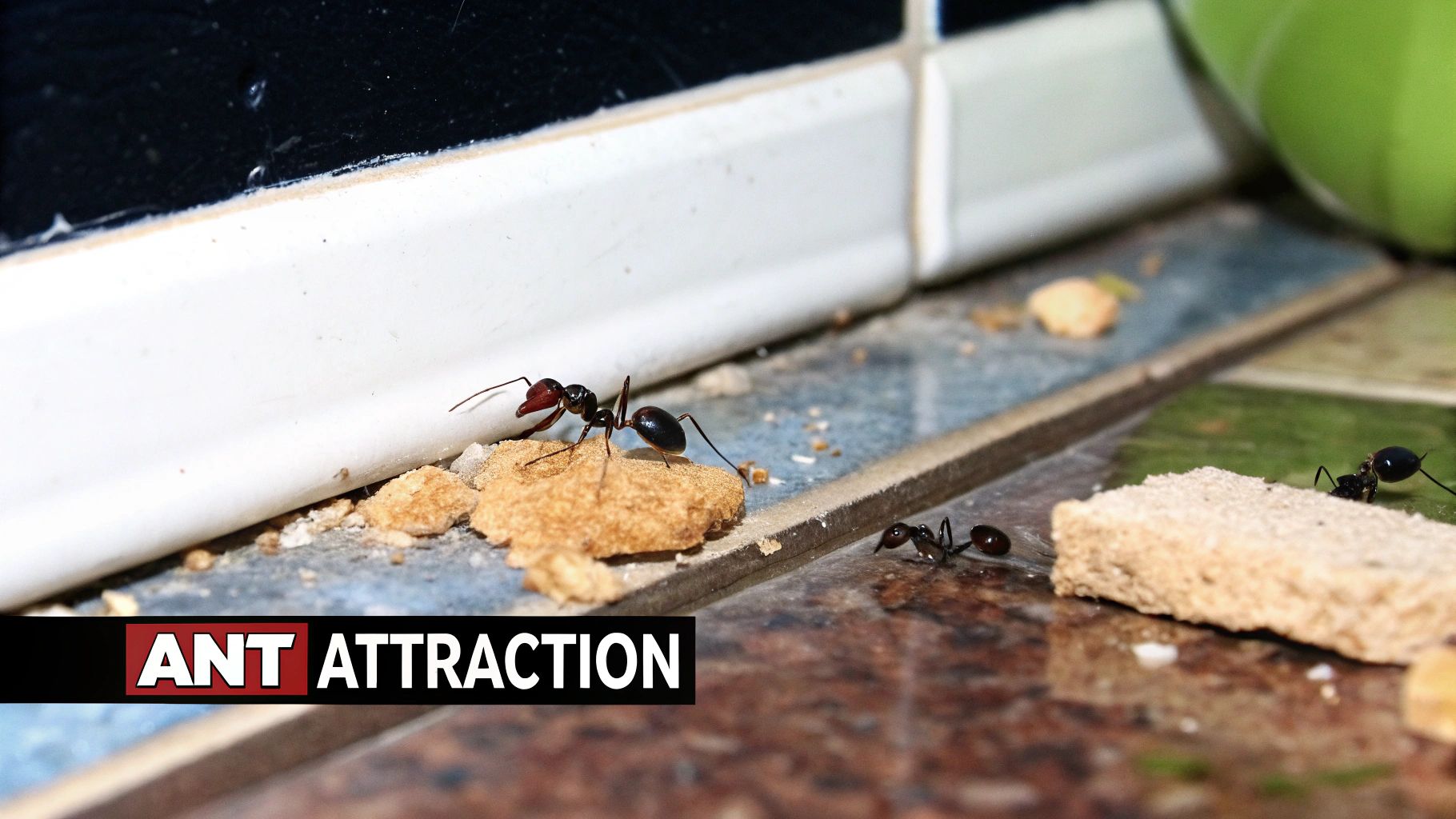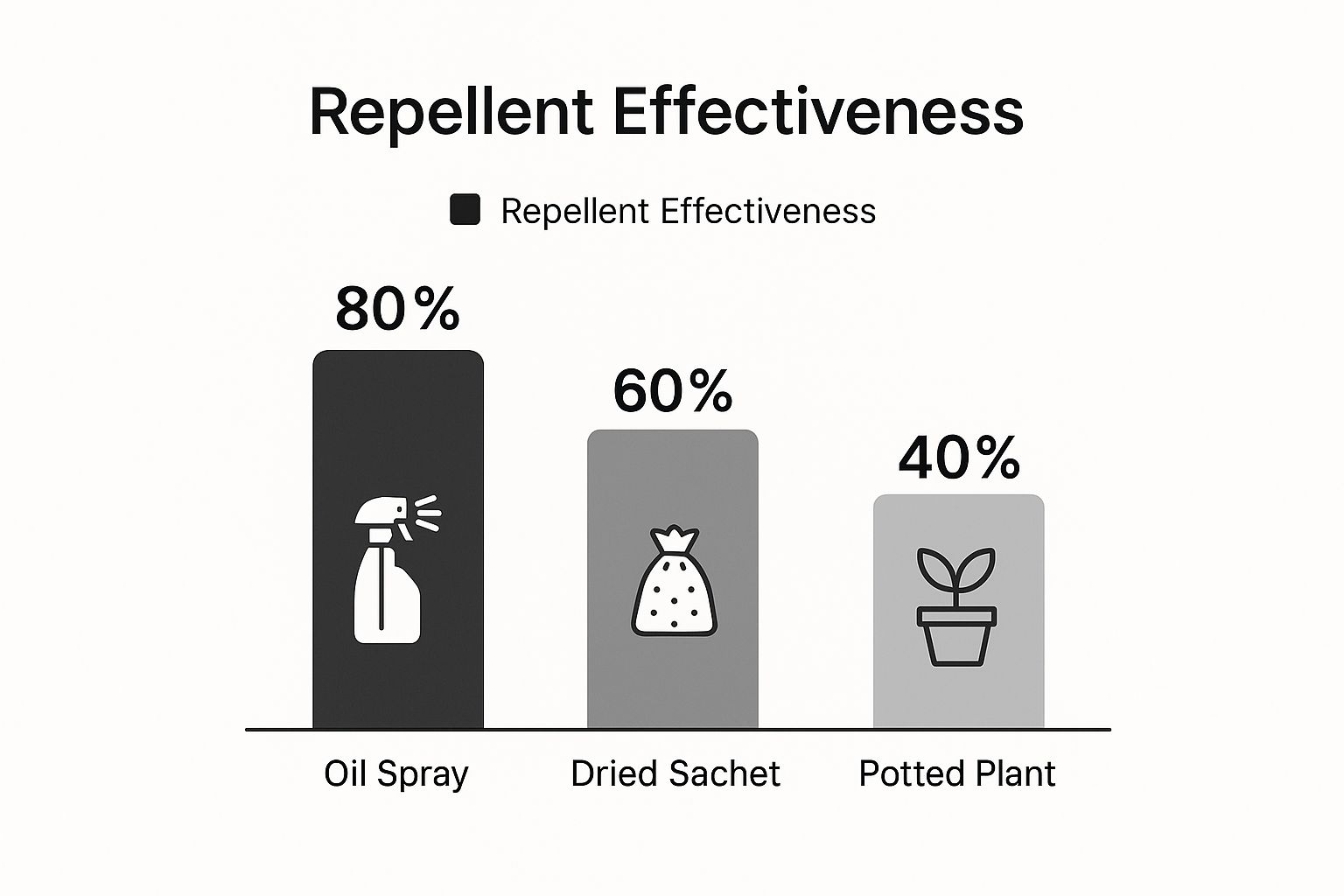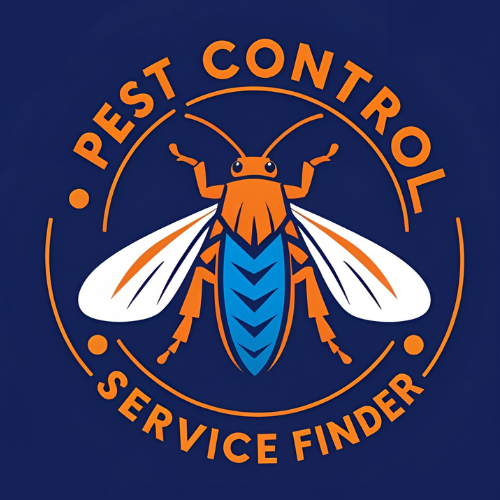Does Lavender Repel Ants? A Practical Guide

For immediate and effective ant control, the best first step is a professional solution. Call +1 855 224 3071 now to connect with a pest control expert who can handle the problem quickly.
But if you're exploring natural ways to keep those first few ants from becoming an army, you've probably heard about lavender. So, does it actually work? The short answer is yes, but it's not a silver bullet. Its success really hinges on how you use it and how strong it is.
The Truth About Lavender and Ants

Many homeowners love the idea of using something natural and pleasant-smelling for pest control. The good news is that lavender isn't just an old wives' tale; there's real science behind its ability to deter ants.
The magic is in the essential oil, specifically two powerful compounds: linalool and camphor. Ants are incredible navigators, using invisible chemical trails (pheromones) to lead their colony straight to your kitchen counter. The strong scent of lavender basically throws a wrench in their GPS. It masks those pheromone trails, creating confusion and making them look for an easier, less frustrating path.
Understanding Lavender's Role
It's really important to have realistic expectations. Think of lavender as a bouncer, not an exterminator. It’s great for prevention and for stopping a small-scale scouting mission, but it won't wipe out a colony that’s already set up shop in your walls.
- As a Deterrent: Lavender is perfect for creating a "no-go zone" in places like your pantry, along windowsills, or on kitchen counters.
- For Minor Issues: If you spot a few scout ants, lavender can stop them from laying down a trail for hundreds of their friends to follow.
- Not an Eradicator: This is key. It will not kill an ant colony or solve a major infestation. For that, you absolutely need a professional solution.
If natural remedies aren't cutting it and the ants keep coming back, it's time for professional help. Don't wait for the problem to get worse—call +1 855 224 3071 to connect with a local expert who can find and eliminate the source for good.
Before we get into the step-by-step methods, this quick table gives you a snapshot of what to expect from different lavender approaches.
Lavender Ant Repellent Methods At a Glance
Here's a quick summary of the different ways you can use lavender to keep ants at bay, along with how effective you can expect each one to be.
| Method | Form | Effectiveness Level | Best For |
|---|---|---|---|
| Essential Oil Spray | Liquid spray | High | Directly targeting entry points, countertops, and visible ant trails. |
| Dried Sachets | Dried plant | Medium | Preventing ants in enclosed spaces like drawers, closets, and pantries. |
| Potted Plants | Live plant | Low to Medium | Creating a long-term, low-intensity repellent barrier around your home. |
| Infused Cleaner | Liquid | Medium | Regular maintenance cleaning on floors and surfaces to deter scout ants. |
This table helps you choose the right tool for the job. Now, let's break down exactly how to use each of these methods for the best results.
How Lavender Overwhelms an Ant's Senses
When you've got a serious ant invasion, the quickest way to shut it down is to call in the pros. Get immediate help from a local exterminator by calling +1 855 224 3071. But if you're curious about why a simple plant like lavender messes with ants so much, you have to think like an ant.
Ants don't see the world; they smell it. Their entire society runs on scent, using invisible chemical roadmaps called pheromone trails to find food, follow their nestmates, and warn of danger. When you introduce lavender, its powerful fragrance hits their world like a sensory bomb. It’s a complete system overload.
Lavender's scent is driven by two main compounds: linalool and camphor. To us, they smell great. To an ant, it's a blinding fog that completely erases those delicate pheromone trails. They can no longer smell where they're going or where they've been.
The Science of Scent Disruption
Imagine trying to follow a tiny, faint trail of footprints through a thick, disorienting smoke cloud. You'd get lost almost immediately. That's exactly what lavender does to an ant's navigation system. It makes the environment so confusing and hostile that they simply give up and turn around.
This sensory jamming is why lavender is such a popular natural deterrent. A 2022 review covering essential oils for pest control confirmed the power of plant-based repellents. While it didn't give a specific number for lavender, it did show that oils from its plant family (Lamiaceae) delivered 49% to 100% repellency against certain pests. You can read more about these plant-based pest solutions and the science behind them.
Key Takeaway: Lavender doesn't kill ants. It just completely scrambles their communication and navigation tools. This overwhelming scent makes an area impossible for them to navigate, so they avoid it altogether.
Keep in mind, this works best as a preventative measure. It won't wipe out a colony that's already moved in. If ants are marching right past your lavender barriers, it’s a sign the infestation is too big for DIY methods. Call +1 855 224 3071 to get the problem handled at the source.
Comparing Natural Ant Repellent Strategies
When DIY remedies just aren't cutting it against a persistent ant problem, it's time to call in a professional. Call +1 855 224 3071 to connect with a local expert who can shut down the infestation for good. But if you're still exploring natural options, lavender is a solid contender. So, how does it really measure up against other common household repellents?
While lavender is famous for its pleasant smell, it’s not the only trick in the book. Many people swear by vinegar, citrus, and mint to keep ants at bay. Each of these has its own strengths and weaknesses, especially when it comes to scent, potency, and safety for pets and kids.
Vinegar, for instance, is a powerhouse at erasing the scent trails ants follow, but its pungent smell can linger for hours, which isn't ideal for everyone. On the other hand, citrus peels and mint smell great but often need to be reapplied more frequently to stay effective. It's all about finding what works for your ant situation and your home.
Effectiveness of Natural Ant Repellents
Let's break down how lavender compares side-by-side with other popular natural choices. The table below gives a quick overview of what you can expect from each.
| Repellent | Pros | Cons | Pet Safety |
|---|---|---|---|
| Lavender | Pleasant scent, long-lasting aroma, repels other pests. | Slower acting, may not stop a major infestation. | Generally safe for dogs; can be toxic to cats in concentrated forms. |
| Vinegar | Highly effective at disrupting scent trails, cheap. | Strong, unpleasant odor that lingers. | Non-toxic, but pets dislike the smell. |
| Citrus | Fresh, clean scent, readily available. | Needs frequent reapplication, less potent. | Generally safe, but essential oils can be irritating. |
| Mint | Strong repellent scent, grows easily. | Can be invasive in gardens, requires frequent reapplication. | Peppermint oil is toxic to cats and dogs if ingested. |
While some alternatives pack a stronger initial punch, lavender offers a sustained, less overpowering scent barrier that’s perfect for living spaces.
Lavender vs. The Alternatives
When you're picking a natural repellent, you have to think about how long it lasts, how safe it is, and how easy it is to use. Lavender offers a gentler, more aromatic approach, making it a great choice for pantries and bedrooms where you don't want a harsh chemical or vinegar smell.
Key Takeaway: While some alternatives might offer a stronger initial punch, lavender provides a more sustained, less intrusive scent barrier. The best strategy often involves using multiple natural repellents to create a multi-layered defense against scouting ants.
The form you use matters. A lot. This image shows just how much the application method can change your results.

As you can see, a concentrated oil spray is leagues more effective than just having a potted plant nearby. This isn't just true for lavender; it's a rule of thumb for most herbal repellents. Research confirms that higher concentrations mean better results. In fact, some studies found that certain herbal mixes, like cucumber-mint and lemon-garlic, achieved 100% ant repellency when used at a 10% concentration. You can learn more about herbal repellent effectiveness and see the data for yourself.
If you’ve tried these natural strategies and still see ants marching through your home, it’s a sure sign you're up against a large, established colony. At that point, your best bet is to bring in an expert. Call +1 855 224 3071 for a definitive solution.
Putting Lavender to Work Against Ants
If you're ready to put up a lavender barrier but the ants just won't quit, professional help is the next logical step. Call +1 855 224 3071 for a fast and effective solution. For everyone else ready to try this at home, using lavender the right way is what makes the difference.
Turning what you know about lavender into a real ant deterrent comes down to a few simple methods. Each one targets a different part of your home, creating several layers of defense that work together to keep ants out. Let's get into the most effective ways to use lavender in your fight against these tiny pests.
Create a Potent Lavender Oil Spray
One of the most direct ways to use lavender is with an essential oil spray. This lets you hit specific entry points and ant trails with a concentrated blast of the scent they can't stand.
- Mix the Solution: In a clean spray bottle, combine 10-15 drops of a good quality lavender essential oil with one cup of water. It's a good idea to add a few drops of dish soap, which helps the oil and water actually mix instead of separating.
- Apply Strategically: Spray this mixture along windowsills, door frames, baseboards, and right on top of any ant trails you see.
- Reapply Regularly: The powerful scent will fade, so you'll need to reapply the spray every 1-2 days or after you clean the area to keep it working.
This DIY spray is your first line of defense. It’s perfect for throwing ant scouts off the trail and making your home’s main entry points unwelcome. If ants are still marching right over your spray lines, that’s a big hint you need a stronger intervention.
Use Dried Lavender for Passive Repellency
For places where you can't really spray a liquid, like inside a pantry or cabinets, dried lavender is a fantastic, set-it-and-forget-it alternative.
Just tuck some dried lavender sachets into your pantry, cabinets, and drawers. You can also put a few drops of lavender oil on cotton balls and place them in the corners. The slow, steady release of the lavender scent creates an aromatic shield that tells ants to look for food somewhere else.
Remember, if these methods don't get the job done, you're likely dealing with a much larger colony nearby. Don't wait—call +1 855 224 3071 to get connected with a pro who can find and eliminate the nest for good.
When Lavender Is Not Enough
If you're dealing with a serious ant problem that DIY solutions just aren't touching, your best bet is to bring in the pros. Call +1 855 224 3071 right away for a complete and lasting solution.
While lavender is a great deterrent for preventing ants or stopping a few scouts in their tracks, it’s important to know its limits. It’s simply not the right tool for an established infestation.
If you’re seeing large, steady ant trails, finding nests in your walls or foundation, or watching ants march right over your lavender barriers, you're facing a problem that requires more than a pleasant smell. These are all signs of a large, dug-in colony that lavender’s repellent qualities can't handle. Trying to fight a major infestation with just repellents is like using a single paper towel to stop a gushing pipe—it’s just not going to work.
When to Escalate to Professional Help
The staying power of any repellent is a huge factor. Even potent natural oils wear off over time as they're exposed to the elements.
A 2022 study found that while fresh lavender oil achieved a 100% termite mortality rate on treated wood, its effectiveness dropped significantly after weathering. This suggests you need to reapply it constantly to keep it working. You can learn more about lavender oil's effectiveness against wood pests and see its practical limitations for yourself. It’s a clear reminder that natural deterrents demand constant upkeep.
If you find yourself reapplying lavender every day with no real change, it’s a sure sign the ant colony is too big and stubborn for DIY methods. The real source of the problem is likely hidden away, requiring professional tools and experience to find and eliminate.
Don't let the problem get worse. For these more serious situations, the smartest move is to call the professionals at +1 855 224 3071 and let them take care of the infestation for good.
Common Questions About Using Lavender for Ants
When you're dealing with an ant problem that's getting out of hand, the fastest way to solve it is to Call +1 855 224 3071. But if you're trying lavender first, you probably have some questions. Getting the details right makes all the difference between an effective ant barrier and a total waste of your time.

We’ve put together the most common questions people ask about using lavender for ants, with clear, direct answers to help you get it right.
Is Lavender Oil Safe for My Pets?
This is the big one for any pet owner. You have to be extremely careful using lavender essential oil around animals. It can be toxic to cats if they lick it or absorb it through their skin, and some dogs can be sensitive to it as well.
To keep your pets safe:
- Always dilute the essential oil heavily with water before spraying.
- Never, ever apply it directly to your pet's fur or skin.
- Keep your pets out of the room when you're spraying and don't let them back in until all surfaces are completely dry.
- Make sure the area has good airflow.
If you have any doubt at all, it's always smartest to talk to your vet before you start using essential oils in your home.
How Often Should I Reapply Lavender?
Natural repellents aren't a "set it and forget it" solution. That powerful scent ants hate comes from essential oils that evaporate over time. If you want your lavender spray to keep working, you need to be consistent.
As a general rule, you’ll need to reapply your lavender spray every 1-2 days around key ant entry points like windowsills, baseboards, and doorways. You should also spray again right after you clean or if a rainstorm washes away any outdoor barriers.
Does the Type of Lavender Matter?
Yes, it absolutely matters. Not all lavender is created equal when it comes to bug-repelling power. The secret weapon is a compound called linalool, which has known insecticidal properties that ants just can't stand.
For the best results, you want lavender varieties that are packed with linalool. The most potent and recommended species is English lavender, or Lavandula angustifolia. It typically has the highest concentration of the stuff that sends ants marching in the other direction.
If you’ve tried lavender and you’re still seeing ants, don't wait. Call +1 855 224 3071 for professional help.
When DIY methods don't cut it, Pest Control Service Finder is here to connect you with local, trusted exterminators who can get rid of your ant problem for good. Get a no-obligation quote by visiting https://pestcontrol-service-finder.com and take back your home.

